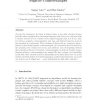Free Online Productivity Tools
i2Speak
i2Symbol
i2OCR
iTex2Img
iWeb2Print
iWeb2Shot
i2Type
iPdf2Split
iPdf2Merge
i2Bopomofo
i2Arabic
i2Style
i2Image
i2PDF
iLatex2Rtf
Sci2ools
112
click to vote
ALT
2006
Springer
2006
Springer
Iterative Learning from Positive Data and Negative Counterexamples
A model for learning in the limit is defined where a (so-called iterative) learner gets all positive examples from the target language, tests every new conjecture with a teacher (oracle) if it is a subset of the target language (and if it is not, then it receives a negative counterexample), and uses only limited long-term memory (incorporated in conjectures). Three variants of this model are compared: when a learner receives least negative counterexamples, the ones whose size is bounded by the maximum size of input seen so far, and arbitrary ones. A surprising result is that sometimes absence of bounded counterexamples can help an iterative learner whereas arbitrary counterexamples are useless. We also compare our learnability model with other relevant models of learnability in the limit, study how our model works for indexed classes of recursive languages, and show that learners in our model can work in non-U-shaped way — never abandoning the first right conjecture.
ALT 2006 | Arbitrary Counterexamples | Machine Learning | Negative Counterexamples | first Right Conjecture |
Related Content
| Added | 14 Mar 2010 |
| Updated | 14 Mar 2010 |
| Type | Conference |
| Year | 2006 |
| Where | ALT |
| Authors | Sanjay Jain, Efim B. Kinber |
Comments (0)

